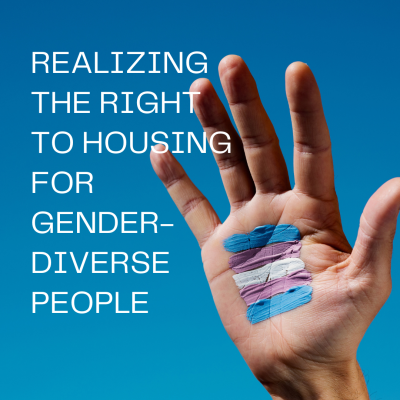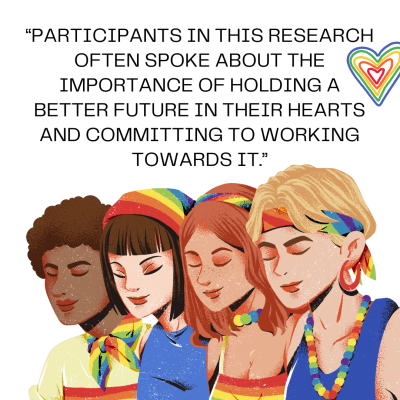As part of Pride Month, CAEH is revisiting a session on the right to housing for gender-diverse people from the 2023 National Conference to End Homelessness, presented by Alex Nelson and Jayne Malenfant.
During Pride, we at CAEH celebrate the resilience and accomplishments of the Queer community. We are privileged to work alongside some incredible Queer housing advocates in the journey to end homelessness.
However, we are also reminded that the Queer community experiences homelessness at higher rates than the general population. Gender-diverse people in particular face unique challenges and discrimination in the homelessness system. While we’re taking a moment to celebrate as part of and with the Queer community this month, we also recognize rights-based work, especially in housing, is still ongoing.
Some of this work is being done by researchers Alex Nelson, the Community Engagement and Research Specialist with the National Right to Housing Network, and Jayne Malenfant, an Assistant Professor at McGill University.

At the 2023 National Conference on Ending Homelessness, they presented research stemming from the results of a pan-Canadian study with gender-diverse advocates, along with a literature review and practice scan on gender diversity in the shelter and housing system, to highlight the difficulties the Queer community faces, present possibilities for preventing and acting on rights violations for gender-diverse people, and equip participants with the strategies and resources they need to create inclusive and welcoming spaces.
The national survey, conducted in 2021 by Dr. Kaitlin Schwan and other researchers with the Women’s National Housing and Homelessness Network, connected with 500 women, girls and gender-diverse people across the country to gather firsthand experience about the challenges and barriers faced by these underserved and overrepresented communities. Hearing from firsthand experience was vital because the landscape is constantly evolving.
This subsequent project, to delve deeper into the experiences of gender diverse communities was commissioned by the Office of the Federal Housing Advocate in 2022 and focused on the housing needs and experiences of Two-Spirit, trans, and non-binary individuals in Canada.
The research team itself was led by the Women’s National Housing and Homelessness Network, and was primarily composed of people with lived experience of homelessness and who are gender diverse. This foundation of lived experiences and personal insights was crucial for Alex Nelson and Jayne Malenfant who understood the barriers and challenges of navigating social service systems from their own personal experiences. Yet their own perspectives were just the starting point—through their research, they uncovered a broader spectrum of barriers faced by gender-diverse people experiencing homelessness.
The results that Jayne and Alex shared at the National Conference revealed some stark statistics about the challenges faced by gender-diverse people:
- Housing Condition Issues: 44% of participants reported having to move due to problems with their housing conditions, such as bed bugs or lack of heat. 69% cited affordability issues as a barrier to finding or maintaining housing.
- Safety Concerns: 41% of gender-diverse participants felt unsafe in their living situation or neighbourhood.
- Discrimination: 26% lost housing due to discrimination or harassment. 43% experienced discrimination from landlords or property managers based on their gender identity. 41% faced discrimination from staff at homeless shelters and drop-ins.
- Impact of Public Systems: 19% indicated that the healthcare system contributed to their housing instability. 28% highlighted the education system as a factor, with gender-diverse individuals nearly three times more likely than cisgender women to cite this issue. A third of participants identified the criminal justice system as a contributor, almost double the rate for cisgender women.
- Security of Tenure: 46% lost housing due to a breakup. 43% were told to leave by someone they lived with. Gender-diverse individuals were twice as likely to be unable to access legal support for housing issues.
- Homelessness Experiences: 43% experienced homelessness before age 16. They were significantly more likely to be unable to access a shelter bed when needed and more likely to sleep in public places compared to cisgender women. Over half had spent more than six months homeless in the past year.
In administering the survey, the Women’s National Housing and Homelessness Network heard repeatedly about the need for safe, stable housing. People want a place where they can build their communities, families, and networks—in short, a place they can call home.

In particular, three major themes related to housing emerged: the right to equality and non-discrimination, the right to security of tenure, and the right to affordability and habitability in housing. These highlight the multifaceted barriers that Queer and gender-diverse people face and guide the team’s efforts to challenge and transform the current system’s rigid gender binaries.
Through this project, the team unearthed valuable insights, but more importantly, they’ve been reminded of the optimism, resilience, and dedication within Queer communities. Alex Nelson says that one of the things that came out in conversations was a kind of hope, a possibility that things can change even though things feel so heavy and so devastating. Interviewees and participants in this research often spoke about the importance of holding a better future in their hearts and committing to working towards it.
One other important theme that emerged from the research was the feeling among Two-Spirit, transgender, and other gender-diverse individuals that they are often over-researched. They’ve shared their stories and knowledge repeatedly, yet they see little change. This feedback underscored the importance of not just gathering data but also driving meaningful action based on that data.
We need to remember: these numbers are not just data points; they represent real lives and struggles. The stories behind these statistics fuel the team’s commitment to change.
As Alex Nelson, Jayne Malenfant, and the Women’s National Housing and Homelessness Network continue their work, they are committed to using their research, including these insights, to advocate for tangible, systemic changes that ensure all gender-diverse individuals have access to safe, stable, and affordable housing.
